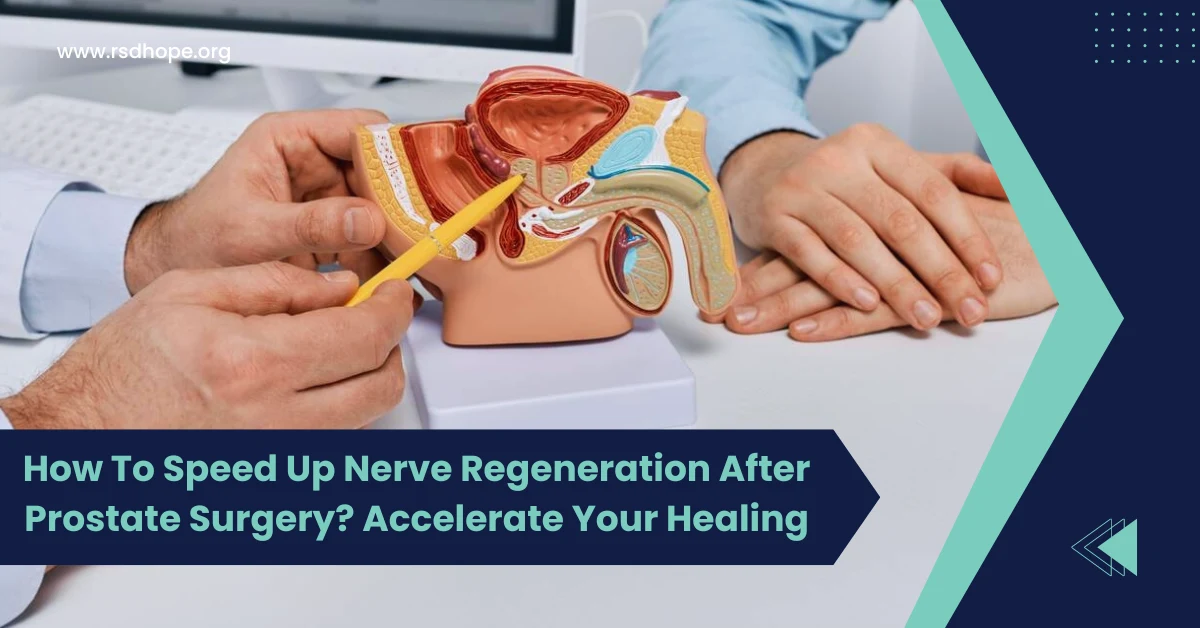This blog post aims to provide guidance on accelerating nerve regeneration after prostate surgery. Nerve regeneration is crucial for post-surgery recovery and overall quality of life. In the following sections, we’ll dive into understanding prostate surgery, the process of nerve regeneration, and effective strategies to promote healing.
Key Takeaways
- Nerve regeneration is a gradual process that can be influenced by various factors, including age and overall health.
- Engaging in regular physical activity, following a balanced diet, and seeking emotional support can aid nerve healing.
- Recovery timelines vary, and it’s essential to consult with a healthcare provider for personalized guidance.
Understanding Prostate Surgery
Prostate surgery, such as radical prostatectomy or robotic-assisted laparoscopic prostatectomy, can potentially impact the surrounding nerves responsible for sexual and urinary functions. According to the American Cancer Society, nearly 100% of men experience some degree of erectile dysfunction immediately after prostate surgery. Patience and proactive measures are necessary to support nerve regeneration post-procedure.
Also Read: 10 Worst Foods For Prostate Health
Nerve Regeneration After Prostate Surgery
Nerve regeneration is a complex and gradual process. The body initiates healing by sending specialized cells to the damaged nerves. Factors like age, overall health, and the extent of nerve damage during surgery can influence the speed and success of regeneration. The National Institute of Neurological Disorders and Stroke states that the recovery of nerve function can take several months or even years.
How to Speed Up Nerve Regeneration After Prostate Surgery
To enhance nerve regeneration, consider the following practical tips and strategies:
- Engage in regular physical activity and exercises that promote blood circulation.
- Follow a balanced and nutritious diet rich in vitamins, minerals, and antioxidants.
- Consider complementary therapies like acupuncture or physical therapy.
- Discuss with your healthcare provider the potential benefits of nerve growth factors or medications.
- Explore nerve stimulation techniques, such as pelvic floor exercises or electrotherapy.
- Seek emotional support and counseling to manage stress and anxiety, which can hinder healing.
How Long Does It Take Nerves To Heal After Prostate Surgery?
The duration of nerve healing after prostate surgery varies significantly among individuals. It may take several months to years for nerves to fully heal, and some patients may experience ongoing improvements over time.
A study published in the Journal of Urology found that about 40% of men regained erectile function within a year following prostate surgery, while others continued to see improvements up to three years post-surgery. Consult your healthcare provider for personalized information and guidance.
Conclusion
Understanding prostate surgery and the process of nerve regeneration is essential for optimizing recovery. By adopting strategies to speed up nerve regeneration, such as regular exercise, a balanced diet, and seeking emotional support, you can proactively support your healing journey. Remember, recovery timelines vary, so be patient and work closely with your healthcare provider to regain optimal function and quality of life.
Read More: Signs Of High Testosterone In A Man: All You Need To Know!
FAQs
A: While lifestyle changes can significantly support nerve regeneration, they should be combined with medical guidance for the best results.
A: Yes, some patients continue to see improvements in nerve function even several years post-surgery.
A: Yes, stress and anxiety can hinder the healing process, making emotional support and stress management crucial for recovery.
A: Absolutely. Always consult your healthcare provider before beginning any new therapies or exercises to ensure they are safe and appropriate for your specific situation.
References:
About Your Prostate Surgery – https://www.mskcc.org/cancer-care/patient-education/about-your-prostate-surgery

